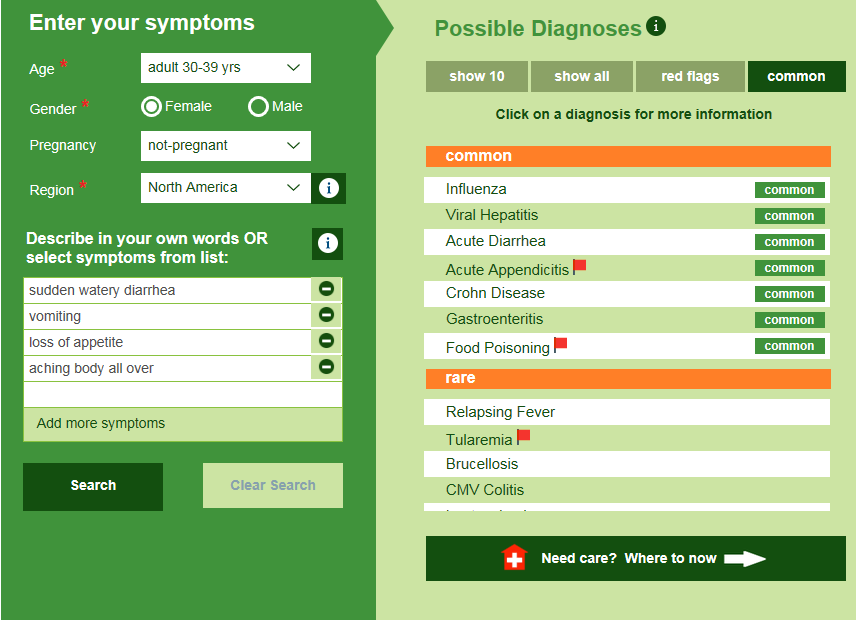- Privacy Policy
- Terms & Conditions
- Contact us
- ©Isabel Healthcare 2025
Winter Bugs - common cold, influenza and gastroenteritis
 Winter has arrived and with a combination of the colder weather which bugs thrive in, and the buildup for the holiday festivities, there is an increase in winter illnesses at this time. This leads to increased demand in Doctors’ offices, ERs and hospitals filling up with patients who are unwell. Here are some of the more common winter illnesses which can present at this time of year.
Winter has arrived and with a combination of the colder weather which bugs thrive in, and the buildup for the holiday festivities, there is an increase in winter illnesses at this time. This leads to increased demand in Doctors’ offices, ERs and hospitals filling up with patients who are unwell. Here are some of the more common winter illnesses which can present at this time of year.
Common cold
The winter months is when the common cold thrives and leads to the greatest incidence of people with cold symptoms. When the weather is cold we spend more time indoors in the warm which assists the sharing of germs with others we are in contact with. The viruses that cause colds spread easily in cold, drier air and the peak cold season tends to last from September until April. A cold is a viral infection and symptoms can include:
- Runny nose/nasal congestion
- Sore throat
- Cough
- Headache
- Fever - normally low grade fever, which occurs early in the illness
Children may have additional symptoms and feel tired, have a sore throat, cough, headache, mild fever, muscle aches and a reduced appetite. Young children also tend to have thick yellow or green mucus from their nose. If these symptoms worsen or the fever is unusually high then you should consult a doctor.
The duration of a cold worsens over 3-5 days and then improves to complete resolution of all symptoms by day 7-10. Colds thrive in children as they are developing their immunity, are in close contact with lots of other children, and their hygiene with hand washing may not be a truly learned behavior. Some children can have many episodes of a cold in one year.
Colds will clear up on their own without any specific medical treatment. They are caused by a virus and medicine cannot cure a cold. Treatment is aimed at easing the symptoms of muscle aches, headaches and fever and for these acetaminophen or ibuprofen will help.
Prevention is the best cure, so avoiding a cold should be top of your list this season. Apart from maintaining a general wellness and immune system through good diet and lifestyle, you can also avoid being around someone who has a cold, wash hands well and often (especially after blowing your nose), sneeze or cough into a tissue rather than your hand or the air, and do not share towels, drinking glasses or utensils with someone who has a cold.
Influenza – the flu
Seasonal influenza (flu) viruses are detected year round but the flu virus is most common during the fall and winter with peak activity between December and February of each year. Flu spreads by droplets when people who have the flu cough and sneeze. These droplets can reach others who are within 6 feet of the person with flu. The droplets can land in the mouth and noses of people nearby or can be inhaled by others. Touching a surface or object where flu droplets have landed may also aid the spread if a person touches that surface and then their own mouth or nose. People are most contagious in the first 3-4 days of their illness but flu droplets can infect others starting 1 day before the symptoms develop and continue for 5-7 days after becoming sick. Children or people with a weak immune symptom may remain contagious for longer than 7 days. Flu is therefore very contagious as you can pass the flu onto someone else before you know you are sick. Some people can have the flu virus but not display any symptoms and they also can pass the flu virus onto others. Flu symptoms usually come on suddenly and include:
- Fever (although can be absent) and/or chills
- Cough
- Sore throat
- Runny or stuffy nose
- Muscle or body aches
- Headaches
- Fatigue (tiredness)
- Vomiting and diarrhea (more common in children than adults)
Flu can cause other complications including pneumonia, sinus and ear infections, which can be life-threatening if the coinfection isn’t detected as its normally caused by a bacterial infection, which in turn can lead to sepsis. If these complications occur, recognizing them early will allow successful treatment with antibiotics. Emergency warning signs of flu sickness include: fast breathing, bluish skin, unable to hydrate yourself, irritability, chest or abdominal pressure, dizziness, confusion, persistent vomiting or flu like symptoms which return with a fever and a very bad cough. If any of these symptoms develop as you have flu then you should seek emergency help.

For uncomplicated flu there are antiviral drugs available which can prevent serious complications developing and make you feel better faster than allowing the flu to run its course. Each year the government health organizations in the UK and the USA develop flu vaccines containing the more common strains of flu which they think will be prevalent in the flu season for that year. People can opt to have these vaccinations annually although you can still get flu from a strain which may not be in the vaccine as there are so many different bugs which can cause flu. If you have flu then keep away from others, wear a facemask if you need to seek medical care or use a tissue to prevent droplets released from coughing and sneezing spreading. Wash your hands often to keep from spreading flu to others.
Gastroenteritis - the winter vomiting bug
Having covered the two common respiratory illnesses which people are susceptible to in the winter there remains one more common illness of the gastrointestinal tract which causes disablement and misery to many in colder weather of gastroenteritis or the “winter vomiting bug”. Gastroenteritis is a very common condition which causes diarrhea and vomiting and is caused by bacteria or a virus. It is very unpleasant but it normally clears up by itself within a week. Gastroenteritis symptoms include:
- sudden watery diarrhea
- feeling sick
- vomiting
- mild fever
- loss of appetite
- aching limbs
- headaches
Symptoms appear within 24 hours of being infected and last around a week.
Gastroenteritis symptoms will normally resolve without seeking medical care and you can help yourself by drinking plenty of fluids and use rehydration sachets available from pharmacies, take acetaminophen according to medication instructions for any fever, aches or pains, get plenty of rest, eat small amounts of plain food such as soup, rice, pasta and bread.
Gastroenteritis also spreads very easily and hand washing is extremely important to prevent cross contamination. You should remain off work or school until at least 48 hours after your symptoms have resolved which will prevent passing the bug onto others.
You should seek medical advice if:
- You are unable to maintain your hydration by drinking enough fluids to combat the amount of fluid you are losing via vomiting and diarrhea.
- You have persistent dizziness
- You are only passing small amounts of urine
- You have a change in consciousness
- You experience bloody diarrhea
- You have an abnormally high fever
- Your symptoms are worsening and not improving with any action you are taking.
Those with an underlying chronic condition or who have a weak immune system should be very cautious of complications developing.
With good infection control measures of hand washing and staying away from others when unwell with colds, flu or gastroenteritis it is possible to reduce the incidence of these common winter bugs which cause misery to many each year.
If you want to explore the symptoms you are experiencing then you can seek further assistance from the Isabel Symptom Checker and find out where to seek care for your symptoms.

Mandy Tomlinson
Mandy has worked for Isabel Healthcare since 2000. Prior to this, she was a Senior Staff Nurse on the Pediatric Infectious disease ward and high dependency unit at one of London's top hospitals, St Mary’s in Paddington which is part of Imperial College Healthcare NHS Trust. Her experience in the healthcare industry for the past 33 years in both the UK and USA means she's a vital resource for our organization. Mandy currently lives and works in Scottsdale, Arizona.
Subscribe Here!
Recent Posts
Isabel DDx Companion with ChatGPT Integration - to help you diagnose even faster
At Isabel Healthcare, we’ve always been driven by one goal: to make clinical reasoning faster,..Virtual Triage: Do more questions lead to better patient outcomes?
One of the common misconceptions related to virtual triage / symptom checker tools is that the more..List Of Categories
- Differential Diagnosis Decision Support
- Differential diagnosis
- Symptom Checker
- Symptoms
- Medical Error
- Patient Disease Information
- Disease
- Clinical Decision Support
- Diagnostic Decision Support
- Isabel 1 Minute Read
- Diagnosis Error
- Diagnosis Skills Cases
- Healthcare Informatics
- Clinical Reasoning
- Evidence-based Medicine
- Medical Education
- Patient Engagement
- Symptom Triage
- Nurse Practitioner Education
- Nursing Decision Support
- Partnership
- Public Health
- COVID-19
- EHR
- Patient Empowerment
- Patient Safety
- rare disease

Start your FREE Trial today
Try the Isabel Pro DDx generator for 30-days - no payment card details required.




